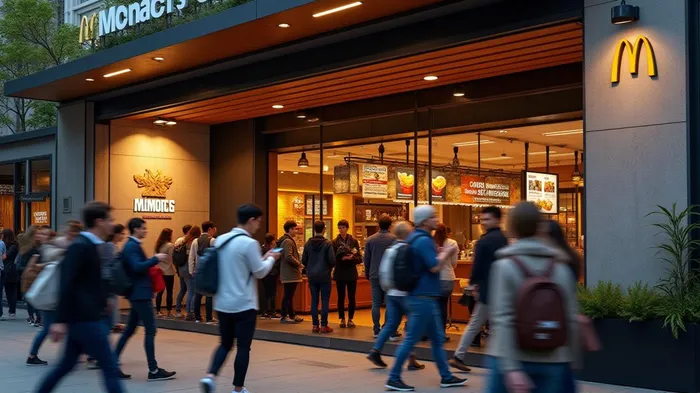McDonald's Strategic Shift: A Return to Core Strengths Fuels Future Growth
The closure of McDonald'sMCD-- experimental CosMc's beverage spinoff by June 2025 marks a pivotal moment in the fast-food giant's evolution. Far from a defeat, this decision underscores a strategic reallocation of resources toward operational efficiency and brand focus—a move that could redefine its trajectory in an increasingly competitive market. By abandoning a costly experiment and reprioritizing its core strengths, McDonald's may be setting the stage for a resurgence in profitability. Let's unpack the implications for investors.

Operational Efficiency: Scaling Back Complexity, Amplifying Synergy
The CosMc's experiment revealed a critical flaw: the operational burden of maintaining a specialized beverage-focused brand alongside McDonald's traditional model was unsustainable. The need for unique processes, technologies, and store formats strained resources, while the lack of scalability threatened margins. By consolidating efforts into its existing infrastructure, McDonald's can now leverage its global supply chain, real estate footprint, and brand recognition to deliver CosMc-inspired beverages in thousands of locations—without the overhead of a separate entity.
The financial rationale is clear: the company's recent sales declines and economic uncertainties demanded a return to its bread-and-butter operations. While the closure itself carries minimal direct financial impact, the strategic shift allows capital to be reallocated toward high-impact initiatives, such as afternoon snack menu innovations. These insights, drawn from CosMc's data (e.g., 80% of orders were non-customized), could boost afternoon sales—a $100 billion market McDonald's is now positioned to dominate without reinventing its core model.
Investors should note that MCD's stock has underperformed the broader market in recent quarters. This decision, however, signals a course correction that could reaccelerate growth.
Brand Focus: The Power of Simplification
The CosMc's closure also addresses a critical risk of diversification: brand dilution. A separate entity competing in the beverage space risked confusing customers and fragmenting marketing efforts. By folding CosMc's insights into its existing brand, McDonald's reinforces its identity as a one-stop destination for all-day dining—meals, snacks, and drinks alike. This cohesion aligns with consumer behavior: CosMc's customers often paired beverages with McDonald's staples, proving there was no need to bifurcate the experience.
Historically, companies that double down on their core competencies outperform those that overextend. Consider Starbucks' focus on premium coffee experiences or Taco Bell's laser-like menu innovation—both thrive by avoiding dilution. McDonald's now joins this ranks, stripping away complexity to deliver a unified value proposition.
Industry Trends: Capturing the Afternoon Snack Opportunity
The afternoon snack market is booming, but so is competition. Chains like Starbucks and Dutch Bros dominate premium segments, while Dunkin' and others vie for convenience-driven customers. McDonald's entry into this space via its existing stores—where it can leverage its unmatched global reach and cost efficiencies—could carve out a unique niche.
Crucially, McDonald's avoids the capital-intensive path of rivals by integrating beverages into its core operations. This plays to its strength: operational scalability. With over 40,000 global locations, McDonald's can test and scale CosMc-inspired drinks faster than any competitor, while maintaining pricing power through its established brand.
Risks and Rewards: Valuation and Growth Potential
The risks here are twofold: execution and market saturation. Successfully rolling out new beverages without disrupting existing operations will test McDonald's supply chain agility. Meanwhile, the afternoon snack market is crowded, and competitors could undercut pricing.
Yet the rewards far outweigh these concerns. By focusing on its core, McDonald's reduces costs, simplifies decision-making, and concentrates its innovation efforts. Analysts project mid-single-digit same-store sales growth post-CosMc's integration, with margins benefiting from operational synergies.
Currently trading at a P/E of ~22x (below its five-year average), MCD offers a valuation discount relative to its growth potential. With dividend yield at 1.5% and a history of shareholder-friendly policies, the stock appears attractively priced for long-term investors.
Actionable Insights for Investors
- Buy the Dip: Use near-term volatility around the CosMc's closure as an entry point. The stock's pullback reflects short-term uncertainty, but the strategic clarity now emerging bodes well for 2025 and beyond.
- Monitor Beverage Rollout Metrics: Track same-store sales in locations testing CosMc-inspired drinks. Early success could catalyze multiple expansion.
- Focus on Margin Improvements: A streamlined operational model should reduce costs over time, lifting profitability.
In sum, McDonald's decision to pivot away from CosMc's is not an admission of failure but a bold step toward recapturing its core strengths. By avoiding the pitfalls of diversification dilution and doubling down on operational excellence, the company positions itself to capitalize on a massive growth opportunity—without sacrificing the brand equity that has fueled its success for decades. For investors, this is a signal to take note: McDonald's is once again betting on itself, and the odds are in its favor.
The views expressed are for informational purposes only and should not be construed as investment advice.
Delivering real-time insights and analysis on emerging financial trends and market movements.
Latest Articles
Stay ahead of the market.
Get curated U.S. market news, insights and key dates delivered to your inbox.

Comments
No comments yet